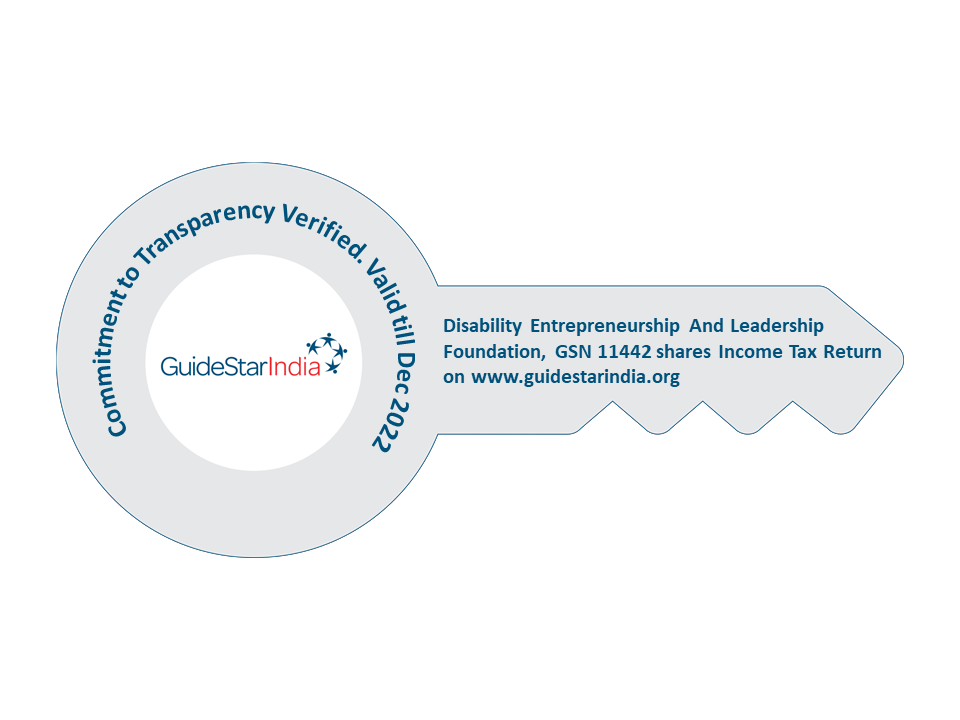In the past two decades, India has witnessed high economic growth and there has been a rise in per capita income. Unfortunately, there are many sections of the population that still remain economically deprived. Though disabled persons constitute a small part of the population, the numbers are growing. The disabled lag behind in terms of education and employment which in turn results in poverty. Inclusive growth is necessary for equitable distribution of wealth and prosperity among all sections of the population.
The challenge is therefore not only to achieve higher economic growth but also to focus on economic inclusion so that all sections of the society are able to take advantage of opportunities. Entrepreneurship has been recognized as one of the tools that drive the economy of a country. Promoting entrepreneurship among persons with disabilities is one way to achieve faster economic integration. We shall now look at the barriers faced by entrepreneurs with disabilities.
Challenges / barriers faced by entrepreneurs living with disabilities:
Many disabled individuals face many obstacles that disallow them from participating effectively in the society and in their entrepreneurial businesses. The following are some of the challenges they face:
- Discrimination:
Discrimination against persons with disabilities is one of the worst social stigmas that society has not been able to overcome. Persons with disabilities are often regarded as people who cannot contribute to anything and are dependent and always wait to be helped. Persons without disabilities often have negative impressions about persons with disabilities, viewing them as inferior. These impressions can foster discrimination when entrepreneurs living with disabilities run their businesses as persons without disabilities will be viewing them as inferior.
- Access to start-up capital:
Disabled persons often experience difficulties financing new start-ups because of limited personal financial resources like savings, home ownership etc. which in turn is partly because of poor education, lower employment rates and the concentration of disabled employees in low-paid occupations, poor credit rating after long-term benefit receipt, disinterest or discrimination on part of banks and lack of accessible information on sources of grants and loans.
- Lack of entrepreneurial education and skills:
India does not suffer from lack of creative spirit: but from lack of business education and entrepreneurial skills that can empower persons with disabilities. Disabled persons often lack specialist business management, legal and financial expertise because of limited relevant education and employment experience and might feel at a disadvantage.
- Market prejudices:
Entrepreneurs face market prejudices which may be due to their gender, age, religion and caste. In addition to the above prejudices, there is reduced demand for goods and services produced by disabled persons. This can reduce the rewards to entrepreneurship to the disabled entrepreneur.
- Business contacts:
Entrepreneurs often rely on their formal and informal contacts for social influence and experience. Disabled persons may again have more difficulty in establishing and maintaining business contacts.
- Role models:
The career choice and future course of action of an entrepreneur are often influenced by others. If the person is of the same social group then the chances of being influenced increases. The lack of role models for the disabled entrepreneurs also acts as an additional barrier.
- Self-belief:
Persons with disabilities often experience exclusion and rejection. The accrual of such repeated experience creates incapacities like self-belief. Therefore they often lack self-belief that they can start and operate businesses successfully. Discouragement from formal and informal sources also discourages disabled entrepreneurs.
- Government support:
Government support as it relates to entrepreneurship is targeted at encouraging entrepreneurship by making favorable environment for the entrepreneurs. Favorable environment can be in terms of policies related to infrastructure, regulations, legal framework financing and taxation etc. Lack of government support for disabled entrepreneurs is also one of the barriers that they face.
Some of the ways to address the barriers that hinder entrepreneurs living with disabilities can be proper education and training, empowerment for entrepreneurs living with disabilities, access to start-up capital and financial support and also support from the government.
(Source: ccsenet.org, ojs.amhinternational.com)
Disability Entrepreneurship And Leadership (DEAL) Foundation works with persons with disabilities across the districts of Gadag and Bangalore. We provide training in farm-based and non-farm based activities to impart the knowledge and skills required for them to start their own entrepreneurial ventures.
For any questions one may have about the blog, please write to us at info@deal-foundation.com.
And to know more about the work we do, please log on to www.deal-foundation.com


 Awarded by Guidestar India
Awarded by Guidestar India